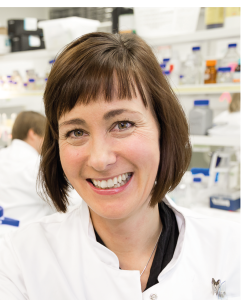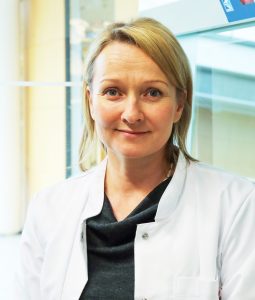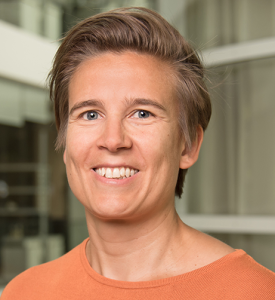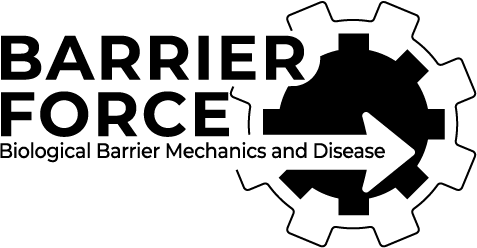Principal Investigators

Johanna Ivaska
Centre’s Director
FiCAN Professor and international leader in cell adhesion biology and cancer.
The Ivaska lab study how biochemical and biophysical cues from the microenvironment facilitate cancer progression and apply this knowledge in ongoing drug discovery programs. Their work has revealed novel regulators of integrin activity, endo/exosomal trafficking and mechanosignalling in normal and disease states. The group also investigates cell adhesion and mechanoresponsiveness in the context of stemness and cell differentiation. They combine state of the art techniques including super-resolution microscopy, unbiased siRNA screens, mechanobiology approaches and micropatterning with relevant in vitro and in vivo models, and the analysis of clinical samples (from Auria Biobank and through clinical collaborations). JI is an EMBO member with prior ERC starting, consolidator and proof of concept grants (one ongoing). She has been invited to contribute review articles to Nature Reviews Cancer, Nature Reviews Molecular Cell Biology and Nature Cell Biology.

Pekka Lappalainen
Academy professor and international leader in the actin cytoskeleton field.
The Lappalainen group studies how structure and dynamics of the actin cytoskeleton are regulated in cells, and how actin-based structures contribute to cell migration, adhesion, morphogenesis, and mechanosensing. For these studies, they use an array of biochemical, biophysical, structural biology, and cell biology methods. PL is an elected EMBO member. Recent highlights form their research include identification of the molecular mechanisms underlying rapid actin filament disassembly and monomer ‘re-charging’ (Nat. Comm. 2018; 2019), and uncovering the mechanisms by which contractile, mechanosensitive actin filament arrays are generated in non-muscle cells (eLife, 2015; Cell Reports, 2018; Curr. Biol. 2017; 2019; 2020).

Pipsa Saharinen
Associate Professor and an expert in vascular biology and an international leader in the field of angiopoietin growth factors. The Saharinen lab aims to understand fundamental mechanisms of blood and lymphatic vascular maintenance and their dysregulation in disease. The group has strong expertise in creating and using genetic mouse models. The group combines state-of-the-art single cell technologies, light-sheet and multiphoton microscopy and in vivo models to study vascular stability and leakage in cancer and severe inflammation. Previous discoveries revealed novel mechanisms of vascular leak and its therapeutic inhibition (Nat Commun 2015, J Clin Invest 2016, PNAS 2018). PS is the recipient of an ERC Consolidator Grant (2018-2022) and serves as a consultant in advisory committee for F. Hoffmann-La Roche. PS is also the chair of an UH-level infrastructure platform of pre-clinical in vivo animal imaging, which is part of the Finnish Biomedical node of EuroBioimaging.

Ilpo Vattulainen
The Vattulainen group focuses on computational biological physics, strengthening the understanding of biological processes to promote health. The research centers on lipids, membrane proteins, lipid-protein interactions, mechanobiology, signaling, drugs, and glycoscience. The research unveils outstanding issues such as type 2 diabetes, cardiovascular disease, cancer, and eye diseases and focuses on high-gain projects coupled to experimental collaborations. Vattulainen (age 52, about 280 publications; H-index 74 with about 17000 citations (Google Scholar); H-index 63 with about 12000 citations (Web of Science (WoS) has a PhD in theoretical physics but his current research profile focuses on biological and soft matter science. His research has been published in top journals (Science, Chem Rev, eLife, Nat Methods, Nat Commun, Nat Chem Biol, PNAS, PLoS Biol, JACS, PRL, PRX etc.) and is closely coupled to experiments: for instance, during the last 5 years Vattulainen has published about 40 joint articles with >30 different experimental groups. The group has been recognized by the ERC Advanced Grant (2012-2017) and the Centre of Excellence status (Academy of Finland 2006-2011, 2014-2019).

Sara Wickström
Associate Professor and international leader in the field of epithelial stem cell–niche interactions and mechanics.
The Wickström lab combines mouse genetics, innovative cell biology and human patient material with state-of-the-art scale-bridging technologies from nanoscale atomic force microscopy and next generation sequencing to whole organism live imaging and in silico modeling. The research is highly interdisciplinary and involves collaborations with mathematicians, physicists and clinical oncologists. SW is an EMBO member and holds an ERC Consolidator Grant (2018-2022). Recent work from the Wickström group has uncovered how tissue-scale forces allow coordination of proliferation and differentiation events to regulate tissue morphogenesis and size (Nat Cell Biol 2018). Furthermore, her laboratory has discovered how extrinsic forces generated by the tissue impact chromatin structure and epigenetic gene silencing, thereby controlling genome integrity, the transcriptional state and lineage commitment of stem cells (Nat Cell Biol 2016, Cell 2020). SW is also a pioneer of various SC culture methods that are currently on their way to intellectual property, patents and commercial licensing (PCT/EP2016/073675 (WO 2017/060240)), highlighting her ability to perform translational research with direct links to biotechnology.
